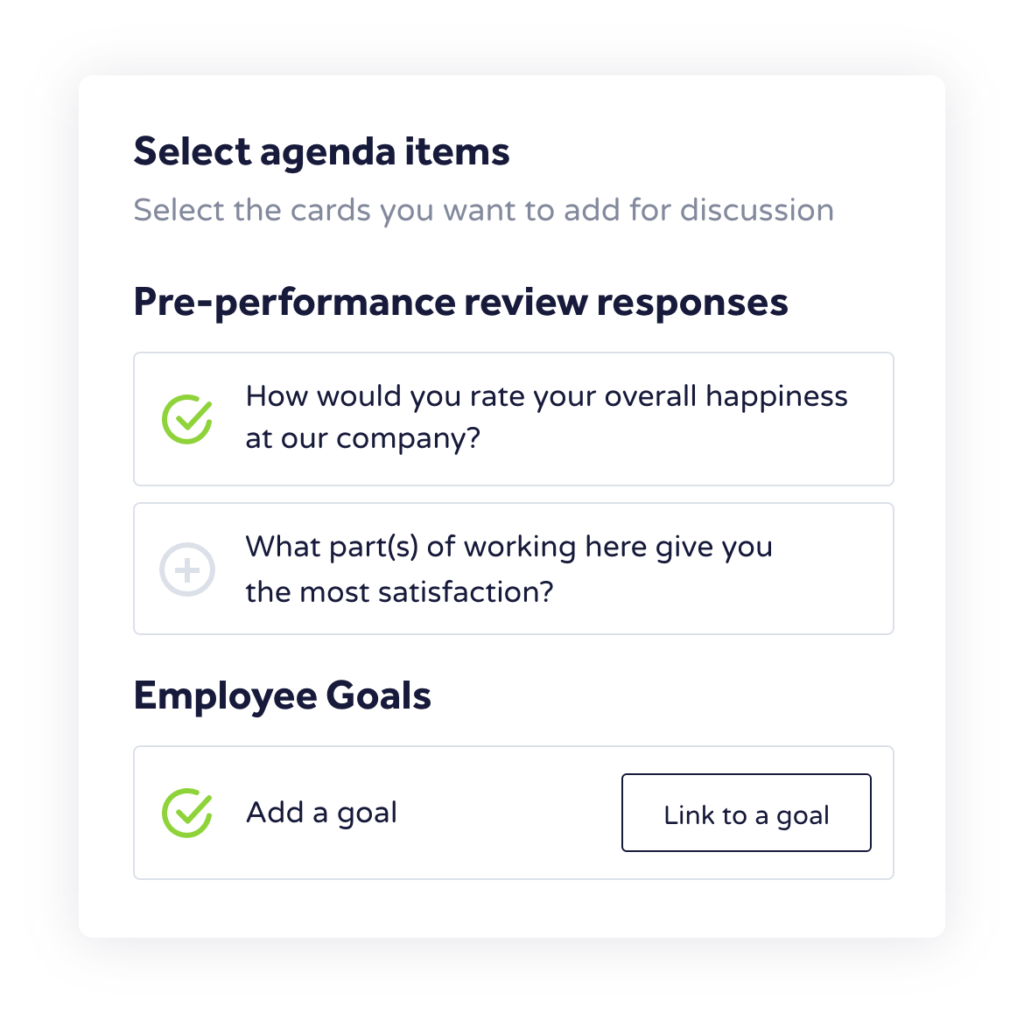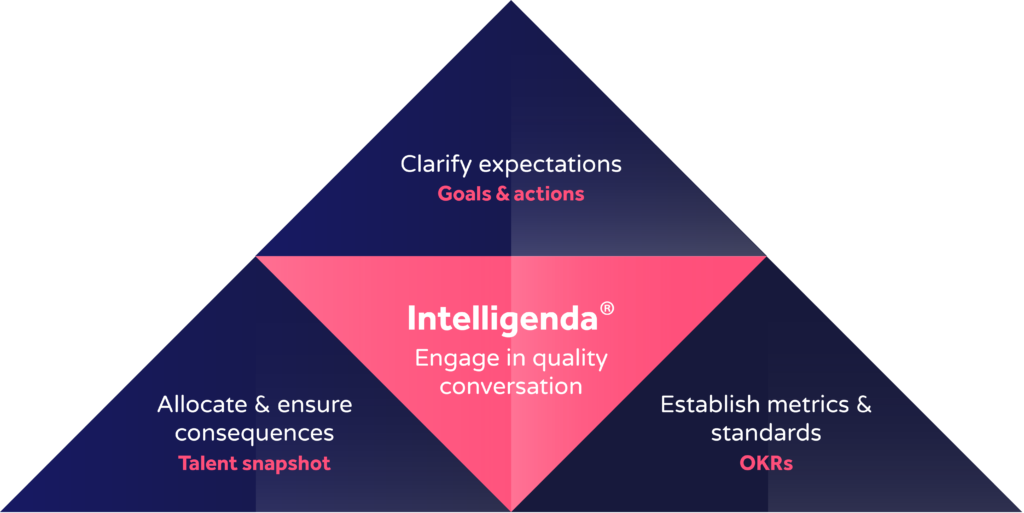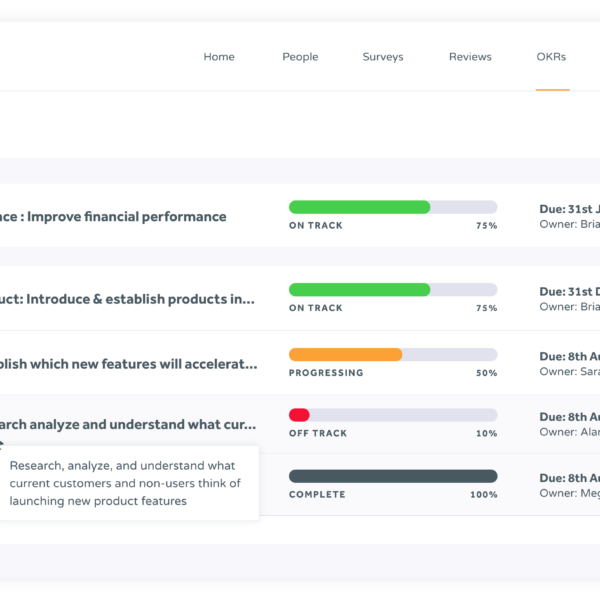Just 41% of employees are performing optimally, which means that the majority of organisations are not maximising their people’s full potential. Therefore, there is a huge opportunity for organisations to close the performance gap and create high-performance teams. But that is often easier said than done.
Dave Ulrich argues that positive performance accountability is crucial to close this gap. He encourages organisations to consider why it matters to them and why they believe they should do it in the first place. This enables leaders to envision what high-performance should look like and identify the consequences of not doing it.
58% of HR executives consider performance reviews an ineffective use of time, and often this is because managers and employees are poorly equipped to have meaningful, quality conversations that drive results and impact their day-to-day activities. But performance management doesn’t have to be a loathed, painful box-ticking process. Dave Ulrich’s four-phase model for performance management is the key to creating high-performance teams:
- Clarify expectations
- Establish metrics and standards
- Allocate and ensure consequences
- Engage in positive conversation
“Your job as a talent leader includes holding others accountable for performance. Some of this comes informally in daily conversations and some comes from more formal performance improvement efforts.”
Positive Performance Accountability
Before we dive into Dave Ulrich’s Performance Management Model, it is crucial to understand who should be accountable at each stage of the performance management process. In our recent webinar “Achieving Optimal Performance with OKRs and Quality Conversations” Dave Ulrich shared an analogy for achieving positive performance accountability:
Consider the individuals in your organisation as the ‘owner’ of their employee experience, who must take responsibility for their own performance reviews, how well they do at work, and assume accountability for their outputs.
Line managers must be considered as the ‘builder’, who works in collaboration with individual employees (the ‘owners’) to make these performance actions happen on a daily basis and support their progression.
Lastly, HR and talent leaders must work as the ‘architect’ to take their employee’s expectations and needs, identify what their line managers can do to help achieve these goals, and design a blueprint to support both parties.
Clarify Expectations
“Expectations are one of the keys to success. When we get expectations clear we win.”
Clarifying expectations is the foundation of performance management and accountability. Without clear expectations, there is no strategic direction or line of sight that enables employees to understand how their performance, goals and actions impact business success.
Your people need answers to questions such as: What do you need from me? What’s the strategy? What do you want me to accomplish?
If company, team and individual expectations are unclear, Dave Ulrich suggests exploring each of these areas and confirming the right approach for your organisation, stakeholders and customers:
- Company vision: A shared direction and shared vision is crucial, and needs to be one that customers care about. The right vision is the one the customer wants and needs.
- Goals: What you will track more of and less of.
- Actions and choices: What you choose to do and not to do, and the decision you make.
- Follow up: Decide how you will know with an outcomes and behaviour exercise.
Establish Standards and Metrics
“Too often we measure what’s easy, not what’s right. Measurements need to be tied to business strategy outcomes to be valued.”
After setting clear expectations for your people and your organisation, how do you know if you’re on track or if you have achieved it? Dave Ulrich advises “if you don’t know how you’re doing you’ll never be able to perform well. You have to track it.”
When deciding which measurements to set, it is crucial to ensure we select metrics that will drive quality and the outcome we desire. Dave Ulrich suggests four key measurements your business should track because all of them matter to ensure your business succeeds:
- Individual behaviour: What did you do? What did you spend time on?
- Individual outcome: What did you accomplish? What was your productivity? What did you produce?
- Collective behaviour: How did our organisation behave?
- Collective outcome: What was our collective outcome as an organisation?
WeThrive enables you to measure all four of these metrics using our integrated OKR tool. In our recent webinar, Dave explained: “This is an example of OKRs in WeThrive, I think it’s terrific. You’ve got a company goal, you’ve got a manager OKR, you’ve got an employee OKR, you are now beginning to measure things in each of those four areas. So this is what we know we are accountable for – and they’re the right measures. It’s measuring the things that will help us succeed with our strategy, and in the marketplace.”
Allocate and Ensure Consequences
“Without meaningful consequences, setting goals and measuring will not change behaviour. People must know what the personal outcome will be.”
The role of HR and talent leaders is to tie the chosen metrics to consequences which will ensure high-performance follows. Consequences can vary from salary, bonuses and cost-sharing to praise, time off and flexibility. But without understanding that they will achieve a positive or negative outcome from their performance, your workforce may stagnate and fall into the 59% of underperforming employees.
If you are unaware of how successfully you have tied consequences to the metrics in your organisation, Dave suggests a short exercise with your employees. Start by listing your key metrics and behaviours. Then ask your employees what the good / bad / unknown outcomes would be according to each metric.
Unsurprisingly, ‘unknown’ always gets the most votes among employees, which is often why we don’t have good outcomes!
Engage in Positive Conversation
“I believe that conversation is so critical. It’s at the heart of OKRs and performance accountability. It’s a critical step that is often only addressed in a static form. But feedback needs to be real-time and frequent.”
How do you ensure that your managers have quality conversations with your employees? Do your employees always leave the conversation feeling better or worse about themself?
Having positive conversations is crucial to deliver quality outcomes. Yet few managers are actually equipped with the knowledge, skills or tools to do this effectively. According to Dave all performance conversations and 1:1s should follow this framework:
- Help me understand
- The data
- To solve the problem
However, the reality is that busy line managers are rarely in a state to have quality, thoughtful performance reviews and 1:1 conversations. WeThrive’s Intelligenda®️ is designed to enable managers and employees to have quality, high-impact conversations every time. It gathers the data you need ahead of time to ensure everyone is prepared for these meetings. The data, expectations, and content is delivered directly to the manager and employee who need it so they can set a quality agenda for the meeting. Employees can add anything they want to discuss so the conversation is focussed precisely where it needs to be – to deliver the most value.
Putting it into Practice
WeThrive can help you take the next steps to put Dave Ulrich’s four-phase performance management framework into practice. Interested in learning more? Book a demo to discover how WeThrive can elevate your approach and deliver results.





